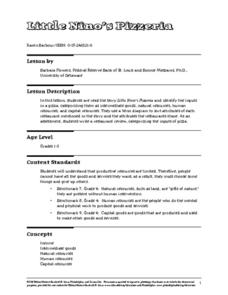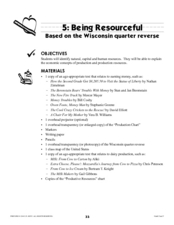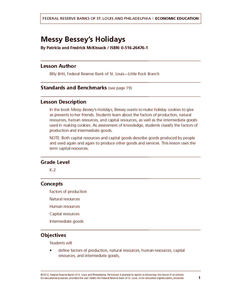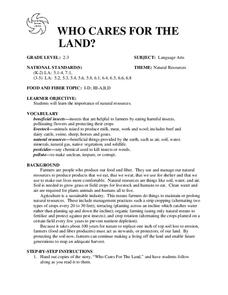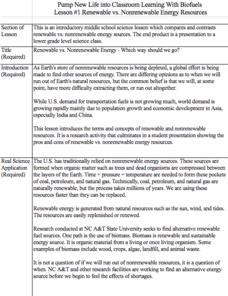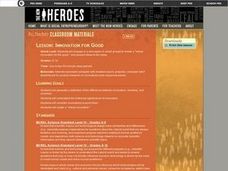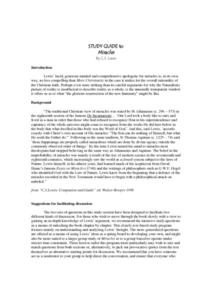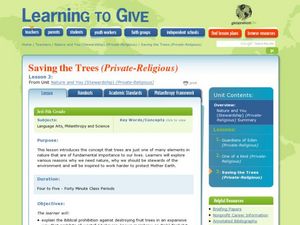Education World
Human Nature- Good or Evil?
Students explore the philosophical nature of good vs. evil. In this literacy/philosophy instructional activity, students read and discuss media articles that illustrate human nature as inherently "good" or "evil." Students practice...
Carolina K-12
Factors of Production and Economic Decision-Making
Class members begin this engaging economics activity by listing all the resources used in producing a car and using that example to draw parallels to the four primary factors of production: capital goods, labor, natural resources, and...
California Academy of Science
Natural Resources Bingo
Bingo isn't just a silly game, it's a great way to practice all types of skills. After reviewing that the earth is composed of natural resources, what those natural resources are, and sustainability, the class plays a game of bingo. The...
K20 LEARN
Lord of the Flies Unit, Lesson 4: Bad to the Bone
Is the nature of humans inherently good or evil? That is the question scholars consider in the fourth lesson of the Lord of the Flies unit. In a Four Corners activity, they examine statements about human nature and stand by the poster...
Federal Reserve Bank
Little Nino's Pizzeria
Engage your youngsters in basic economics by connecting the terms to dessert and pizza! After a discussion about intermediate goods and natural resources, learners read and connect a pizzeria to economic terms.
Curated OER
Being Resourceful: Wisconsin quarter reverse
If your class understands goods and services then they'll be ready for this lesson on various resources. After reading a series of books and engaging in class lecture and discussion, pupils will fill out worksheets. They will list...
Federal Reserve Bank
Messy Bessey's Holidays
Teach your class some fairly complex terms—factors of production, human resources, capital resources, natural resources, and intermediate goods—with a storybook (Messy Bessey's Holidays), plenty of visuals and handouts, and related...
Curated OER
WHO CARES FOR THE LAND?
Students explore the importance of natural resources. They are given copies of the story, "Who Cares For The Land," and students follow
along as the teacher reads it. Students identify the key points in the story. (Soil, water and air...
Chicago Botanic Garden
Introducing Ecosystem Services
Purifying air and water, providing soil in which to grow crops, and moving water through its natural cycle are all services an ecosystem provides that benefit humans. Lesson four in a series lets learners explore and discuss the value of...
Kenan Fellows
Renewable vs. Nonrenewable Energy Resources
Is one type of energy inherently good or bad? Young scientists explore energy resources in a week-long unit. After extensive research, groups create powerful position statements and presentations supporting their energy resource of choice.
Curated OER
The Struggle for Human Rights
Tenth graders identify and clarify a problem, an issue, or an inquiry. They identify the changing nature of families and women's roles in Canadian society. Pupils assess the interaction between Aboriginal people and Europeans. ...
Curated OER
The Three Gorges: Should Nature or Technology Reign?
Students participate in a debate regarding the Three Gorges Dam in China. For this research skills lesson, students prepare for a debate regarding the construction of the Three Gorges Dam in China. Students participate in the dam taking...
Council for Economic Education
Teaching Economics Using Children's Literature
Introduce young learners to the subject of economics using their favorite stories and books. Including 24 separate lessons, this guide covers economic principles such as trade, scarcity, consumer goods and services, renewable and...
Curated OER
Innovation for Good
Many historical innovations were created for the common good. Get your students ready for life as a critical thinker with this lesson which defines the differences between innovation and invention. They will conduct Internet research,...
Wild BC
Is Climate Change Good for Us?
Is it really that big of a deal if the global climate undergoes a little change? Young environmentalists consider this very question as they discuss in small groups the impact of different climate change scenarios on their lives, their...
Curated OER
What Is Sustainability?
Students discuss environmental preservation and sustainability and their role in consumption and preservation. After a brief demonstration of how limited our resources are, students determine which natural resources they use most...
Curated OER
Shackleton's Antarctic Adventure
Young scholars research the exploration of Antarctica by the explorer Sir Ernest Shackelton. In this Antarctic exploration lesson, students watch a movie about Sir Ernest Shackelton and his ship the Endurance. Young scholars study a map...
Curated OER
The Human Organism
Students discuss human emotions and mental health. In this mental and emotional health instructional activity, students write a short story regarding the "think and share" choice. Students include emotion, the connection between...
Curated OER
The Human Mind
Young scholars read and discuss twin studies to explore the debate of nature vs. nurture. They create a list of characteristics and then look for evidence of whether it is primarily a genetic or environmental characteristic. All of the...
C.S. Lewis Foundation
Study Guide to Miracles
Teaching is challenging, so is proving through logic that miracles and divine intervention can happen in this world. It is even more arduous to teach the text of that proposition—good thing there are resources available, like this study...
Curated OER
Saving the Trees
Students identify why trees are important. In this environmental lesson, students read the book The Giving Tree and list reasons why humans need trees. Students create a storybook to explain why other natural resources are important to...
Indian Land Tenure Foundation
A Sense of Belonging
In order to understand how the land changes over time because of the people who live there, learners interview an elderly person about the past. Children ask an older family member to describe what the local area was like when they were...
Clever Student Training Company
Logical Fallacies Recognition
“Should same-sex marriage be allowed?” As part of a study of recognizing logical fallacies learners read John Stemberger’s April 12, 2012 argument against same-sex marriage published on the opinion page of the Orlando Sentinel. They then...
Sociology Central
Society Is Like...
To introduce the idea of different theoretical views about the nature of society, class members engage in a sociology activity that asks them to create an analogy between society and another concept, and then to explain the parallels.






